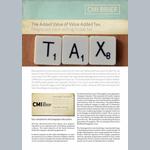Improving tax administration for social and economic development
Value added tax has proved to be an efficient way of increasing government revenue globally, but Africa is lagging behind. Why? And what will it take to change the trend?
Countries all over Africa need more money to finance their public spending. Increasing domestic revenue is key to success, and raising taxes, like the value added tax (VAT), is a potentially efficient way of dealing with the challenge.
Conducting field experiment on tax compliance
Currently, around 80 percent of the countries in sub-Saharan Africa levy a VAT, but the productivity of the VAT – the ratio of actual to potential collections – is much lower here than in any other region. In Tanzania, the outcome is particularly poor.
-The government has tried to improve the effectiveness of the VAT regime by reducing tax evasion. In 2010, they introduced an electronic device issuing VAT-receipts, which automatically registers and transmits information about business transactions to the tax administration. Electronic registration was supposed to reducing administrative and compliance costs, improving transparency and making it easier to detect fraud. But VAT collection has not improved as expected, says Odd-Helge Fjeldstad, research professor at CMI and team leader in a new NORGLOBAL funded project that explores tax compliance and the effectiveness of VAT in Tanzania.
It is a major challenge that many businesses evade taxes by not issuing VAT-receipts to customers In collaboration with the Tanzania Revenue Authority, Fjeldstad and his team will test methods on how to increasing tax compliance. The research team will conduct a large-scale field experiment by setting up a VAT receipt lottery in randomly selected regions in Tanzania.
-We will conduct an experiment where we encourage customers to ask for VAT receipts when shop. The VAT receipt will be used as a ticket in a lottery, and the chances of winning will be proportional to the amount the customer spends. When customers ask for VAT receipts, the salesperson is more likely issue a receipt. When they do, they will use the machine that registers the transaction, hence making transparency and enforcement easier. By encouraging customers to ask for VAT receipts, we expect VAT compliance to increase, says Fjeldstad.
Filling knowledge gaps
Similar experiments have been conducted in some more developed countries, but this is the first time they have been implemented in an African context. Through this project, the researchers aim to contribute to new and policy relevant information about how tax collection can be improved, and about the links between tax, tax compliance, business development and its effect on welfare.
-We will collect detailed information about business development and market prices. By investigating how the VAT affects the prices on goods paid by the customers, business outcomes and formalisation, this will allow us to examine the effects of taxation on business development, since avoiding taxes is one of the reasons why firms are informal and outside the fiscal system.
Collaboration with Tanzania Revenue Authority gives the research team a unique opportunity to communicate the research findings to key stakeholders and policy makers in Tanzania.
Facts about VAT:
Value added tax (VAT) is a tax levied on all sales of commodities at every stage of production. It is added on the purchase price for the buyer, and the seller gains tax credits to offset any taxes previously paid on inputs. Because the sellers can only realise tax credits on their inputs if they have an invoice for the taxes paid, VAT gives sellers the incentive to collect the tax and pay it to the government, and to trade with other formalised firms. This creates a paper trail for transactions along the production chain and provides the government with essential information.
When the transactions taking place are observed, collection and enforcement of taxes becomes easier and compliance is therefore argued to increase. Because of this built-in incentive for businesses to demand receipts from their suppliers, VAT is often referred to as ‘self-enforcing’.
The self-enforcing property of VAT often breaks down at the final stage of the supply chain, where a sale is made to an end customer who cannot claim a deduction on taxes paid and does not have an incentive to ask for the receipt, as this will typically imply a higher price. If a receipt is not issued at this final stage, the government cannot observe and enforce the tax, the seller does not have an incentive to ask for a receipt on inputs from suppliers, and non-compliance trickles up the supply chain.
Publications

The Customer is King: Evidence on VAT Compliance in Tanzania

The Added Value of Value Added Tax: People are more willing to pay tax
Odd-Helge Fjeldstad
Projects

Tanzania as a Future Petro-State: Prospects and Challenges


